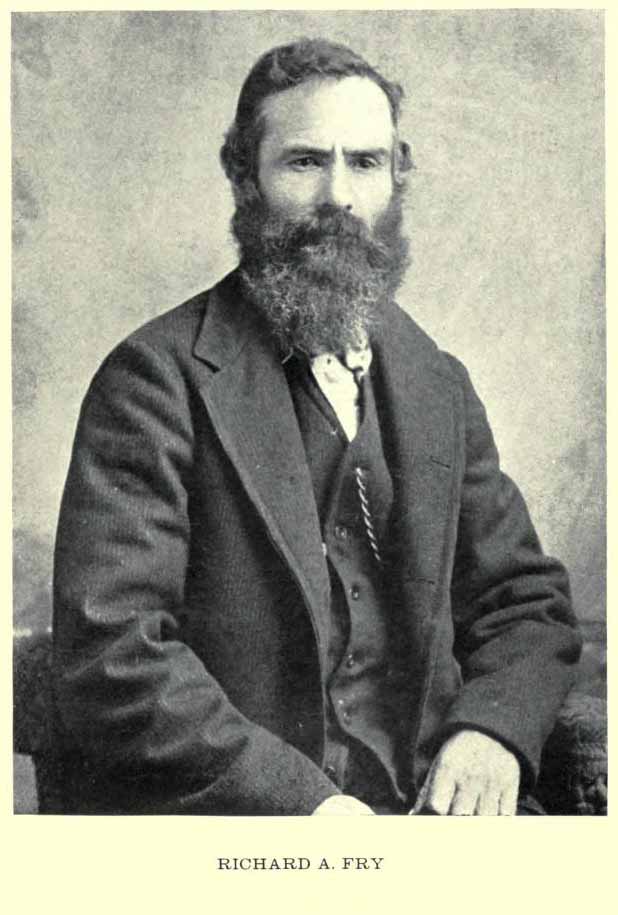RICHARD A. FRY
Richard A. Fry deceased. No compilation that has to do with the history of Kootenai County would be complete without an account of the worthy gentleman and renowned pioneer whose name is at the head of this memoir. No man was better known in all this northwest country than Richard A. Fry. He was a pioneer and frontiersman in the true sense of the word and was a fearless champion of the cause of right and an untiring friend to those in distress. We therefore append a brief recital of the salient points in his career.
Richard A. Fry was born in Knox County, Illinois, in March 1838, and in 1849 he came with his parents to Linn County, Oregon, the having made the trip across the plains with wagons. He participated in the Cayuse Indian War of 1855-6 and assisted to the capture the old Indian warrior, Pu-Pu-Mox-Mox. He was  in company H. Oregon Volunteers then, and the youngest member of the company. After the war spoken of he returned to his home in Oregon and soon left for the Colville country where he engaged in trapping and mining. With his brother, he engaged in the merchandising business at the mouth of the Pend Oreille River and his absence the Indians killed his brother and ransacked the store, taking what they pleased. The British gave him a commission, aided by George Monteur, to order the Indians to desist. He and his companions were captured and while the savages quarreled as to their execution, they escaped and returned to Colville.
in company H. Oregon Volunteers then, and the youngest member of the company. After the war spoken of he returned to his home in Oregon and soon left for the Colville country where he engaged in trapping and mining. With his brother, he engaged in the merchandising business at the mouth of the Pend Oreille River and his absence the Indians killed his brother and ransacked the store, taking what they pleased. The British gave him a commission, aided by George Monteur, to order the Indians to desist. He and his companions were captured and while the savages quarreled as to their execution, they escaped and returned to Colville.
Mr. Fry was familiar with every camp from Victoria to the Kootenai Region and had prospected on nearly every tributary of the Columbia.
He came to Bonners Ferry in 1876, settled down and established a post for trading. He bought the ferry from Mr. Bonner and operated it for sixteen years. He conducted a stage line and pack train from Walla Walla to Wild Horse, a mining camp in British Columbia, and was one of the most prominent men in opening up the country. He was ever on the side of right and the Indians had implicit faith in him and in many cases his kind assistance secured them right from persecutors.
In 1892 he retired to his ranch below Bonners Ferry and his extensive lands, all well handled, proclaimed his skill, thrift and industry.
On December 14, 1898, while attending court business in Rathdrum, the summons came suddenly and Mr. Fry passed away. His funeral, held in Bonners Ferry, was one of the greatest concourses of people ever assembled there on like occasion. The Indians deeply mourned when he passed away. The old pioneers, every acquaintance, and all who knew of him joined in sincere expression of sorrow, for all knew that a good man had gone to his rest and we would see his familiar form dispensing charitable deeds on every hand no more. He was generous to a fault and no man can say that he ever left the door of Richard Fry without food and the comforts of life.
Mr. Fry left a widow and eight children; George, Clarence, Frank, Mrs. Arthur E. Bunting, Mrs. I. J. Brant, Mrs. Charles Ewing, Mrs. George T. Kane, and little Annie, the youngest.
The country is indebted to Mr. Fry for the intrepity and courage he manifested in his career in opening the way for others to follow in the development of this country, in the worthy labors that he did for the welfare of all who lived here and in paving the way for a greater civilization.
– Page 860 “An Illustrated History of Northern Idaho, Embracing Nez Perce, Idaho, Latah, Kootenai and Shoshone Counties, Western Historical Publishing Company, 1903 “